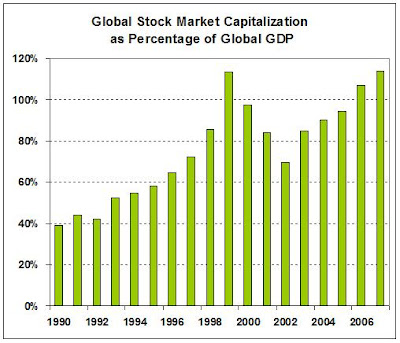From January 2000 to August 2007 (latest data) the total rise in home prices was 114%, i.e. house prices more than doubled on average. In the same time, CPI inflation rose a total of 22.3%. In the next chart we can see how much faster real estate prices (blue line) rose in the US versus inflation (purple line). Obviously this sort of real estate overpricing cannot persist, but the relevant question is: how will the balance be restored?
 The mildest scenario is that real estate prices will gradually ease and then flatten out for a long time, giving inflation a chance to catch up. Given what we already know about mortgage defaults and MBS prices, this is highly unlikely. After the ongoing decline in housing transaction volumes (existing home sales and new construction) the next step will be significant price declines; as we know, in markets price follows volume. A hint came from Mr. Mishkin's paper mentioning a possible 20% decline in house prices, even if this came in the context of a monetary policy model.
The mildest scenario is that real estate prices will gradually ease and then flatten out for a long time, giving inflation a chance to catch up. Given what we already know about mortgage defaults and MBS prices, this is highly unlikely. After the ongoing decline in housing transaction volumes (existing home sales and new construction) the next step will be significant price declines; as we know, in markets price follows volume. A hint came from Mr. Mishkin's paper mentioning a possible 20% decline in house prices, even if this came in the context of a monetary policy model.Another scenario is to engineer a much faster increase in inflation but, as the chart makes clear, this is impossible given the size of the re-adjustment necessary. Anything that even approaches this rate of inflation acceleration would destroy the US economy and the value of the dollar.
So, what is likely to happen? In my opinion, prices will initially break from a combination of bank auctions, builder inventory clearances and speculators rushing to the exit doors. We have hints of the size of this initial price drop from isolated auctions already taking place: as much as 30% off from peak prices. I think that banks will soon feel ecstatic if they can recoup 75% of their loan principal and will increasingly pressure the market downward, in a rush to be first out of the door. (This is what the various ABX indexes are already telling us, by the way.) The second chart also shows that the pressure will not be contained to houses bought in the peak years of 2005-06, because the massive price imbalance vs. inflation started in 2000 - in effect, it is possible that even people who bought houses as far back as 2002 will be negatively affected, particularly in the areas that spiked up the most in price (CA, FL, NV, etc).
Thus, I see a 20-30% initial "break" and then a long period of price under-performance, perhaps lasting as much as a decade that will restore house prices to levels reflecting their utility as homes, rather than trading sardines.
































